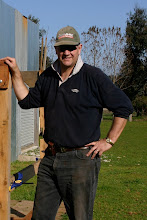I think that's enough to start with - and also enough to be coherent and sustainable if we manage to do it well. So I'm happy to put the last $35,000 down to opportunities at the margin of what we plan to do. I can give some examples of where the dollars might come from:
- selling other people's produce through our marketing system;
- adding other mini crops as seasonal add ins - we already have an asparagus bed, we will plant walnuts and plums (chilli plum sauce). Just today we thought of establishing a big rhubarb patch - cooking apples go with that;
- selling some form of hospitality - which will have the benefit of bringing potential customers to the farm; and
- selling some form of education - which will also bring potential customers to the farm.

This sort of activity will be an essential part of re-localising food. Industrial agriculture deprives farmers of their connections to consumers and has pushed them towards being production specialists. Disconnected from the consumer and dealing with a few very large counter parties, it's hardly surprising that the farmers' share of the food dollar has contracted so far.
We enjoy people coming to the farm. We love the wide eyes of the kids - and the way parents relax. Thanks to Michael Pollan and others there is a growing awareness of the costs of industrial food. So, to some degree, we should be digging in fertile ground. And the advantage we have is - we don't need to convince everyone. In order to get to a $250,000 gross farm income, we're only looking for (say) 125 good, regular customers to buy an average of $2,000 worth of food each year.
Compared with other ways of grossing $250k, this still seems like very hard work. On the way through it's hard to imagine we haven't got $50,000 in direct off farm costs - and another (say) $20,000 in overheads (things like insurance, office costs and various registrations and fees). Then, in our 50s we can't expect to provide all the labour ourselves. Let's say we employ the equivalent of 2 full time people at a total employment cost of $40,000 each. We're now back to $100,000 to provide a return for our labour input - and our investment.
All I can say is - it's good that this something I want to do anyway - because it sure doesn't make sense against either of our day jobs!
I'm an accountant who was a partner in a major firm for 20 years. I haven't earned banker millions, but I have done well enough to qualify as a high income earner. The wife is a registered nurse. Nurses earn a good average wage - very good if the flexibility is taken into account. Neither nurses or even partners in big accounting firms are required to put in much in the way of investment in order to earn of incomes. In the main we turn up and work hard and smart - and that's enough.
It's not enough if you going farming - where we have to invest in our land - and in livestock, crops that don't return income for varying periods of time, machinery, fencing and other infrastructure.
This morning I caught something on Australian TV - it said that in 1950 you could buy a Holden car with what you could get for selling a single bale of wool. Today it takes 35 bales of wool to buy a Holden. Many things go into creating this sort of change in a farmer's terms of trade, but it has to be a sign of just how screwed up the system is. It's not like wool isn't still a valuable fibre.
I have just a suspicion that farmers' terrible terms of trade are going to start reversing - and perhaps have even started to reverse already. It is not why I want to go farming - but it is a part of why I can look at the relatively unpromising numbers I've set out above and still feel like I can't wait to get started!








